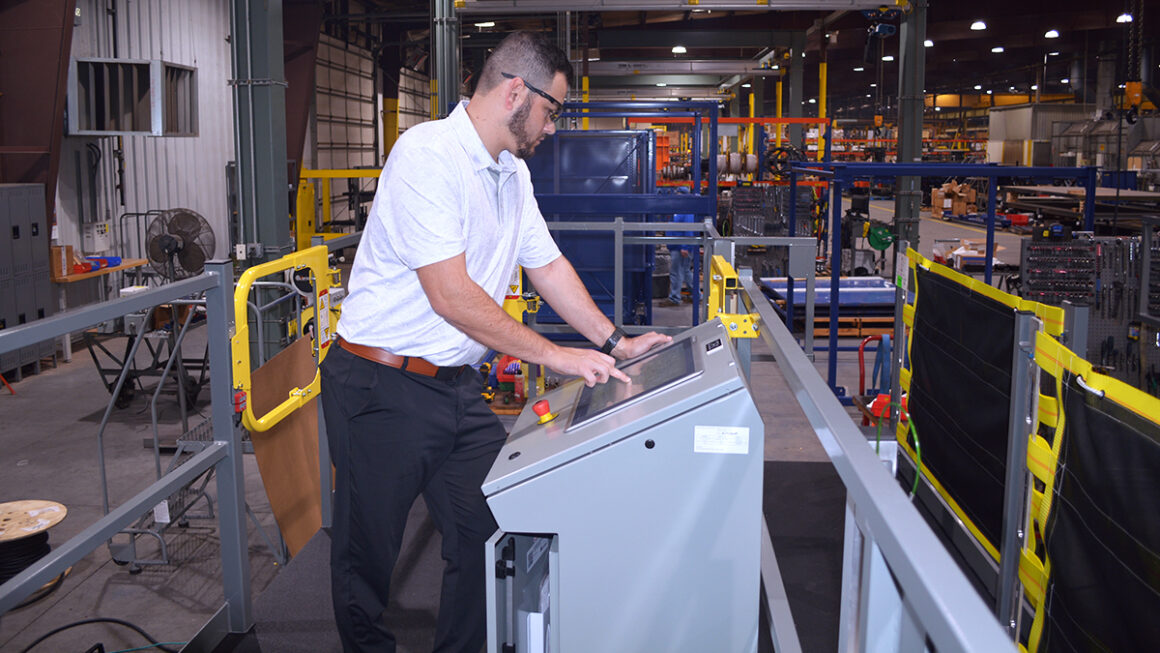Material handling processes form the backbone of modern manufacturing, warehousing, and distribution. As market demands shift rapidly, outdated control systems can undermine efficiency and profitability. By upgrading to a modern, data-driven solution, businesses can boost throughput, reduce costs, and gain a decisive competitive advantage.
In this blog post, we’ll explore the critical reasons for upgrading your control systems, show you how to recognize when it’s time for an overhaul, and walk you through the upgrade process. We’ll also look at the emerging trends shaping the future of material handling. Here’s a quick preview of what’s ahead:
- Setting the Stage for Modern Material Handling
- The Importance of a Forward-Thinking Approach
- What Are Material Handling Control Systems?
- Why Upgrade Your Material Handling Control Systems?
- The Role of Custom Control Systems in Material Handling
- How to Identify When It’s Time to Upgrade Your Control Systems
- The Process of Upgrading—What to Expect
- Future Trends in Material Handling Control Systems
- Partnering with OSCO Controls for Sustainable Growth
- Moving Forward Into the Future With Confidence
Ready to optimize your operations? Contact OSCO Controls for a personalized consultation.
Setting the Stage for Modern Material Handling
The world of material handling has evolved dramatically. No longer limited to basic conveyor lines and manual labor, today’s facilities leverage robotics, automated guided vehicles (AGVs), and IoT-enabled sensors to move products seamlessly. At the core of this transformation lies an intelligent control system—a unified platform that manages hardware, software, and real-time data analytics. However, older infrastructures often struggle to keep up with increasing volumes, varied product lines, and tighter delivery windows.
By upgrading your control systems, you can address these challenges proactively—enhancing uptime, improving ergonomics and safety, and scaling operations to meet new demands. Modern solutions integrate cutting-edge technologies like machine vision, artificial intelligence, and advanced PLCs (Programmable Logic Controllers). As a result, businesses not only maintain smoother workflows but also gain actionable insights for continuous improvement.
The Importance of a Forward-Thinking Approach
Many organizations still rely on legacy setups that can handle day-to-day tasks but fall short on flexibility, optimization, and data-driven decision-making. Over time, sticking with outdated systems can lead to rising labor costs, recurring breakdowns, and suboptimal throughput. A forward-thinking approach—one that embraces customization, integration, and emerging technologies—enables you to respond quickly to market changes and customer expectations.
What Are Material Handling Control Systems?
Understanding the components and technologies behind material handling control systems is crucial for optimizing operations. These systems are designed to streamline the movement, storage, and handling of goods in various industries.
Material handling control systems manage and optimize the movement of materials in warehouses, factories, and logistics centers. These systems incorporate a variety of technologies to streamline operations and improve efficiency. Here are some of the key technologies that make up these valuable systems:
- Programmable Logic Controllers (PLCs): Industrial computers that automate processes, control machinery, and integrate system components.
- Conveyor Systems: Mechanized systems that transport materials efficiently between different points in a facility.
- Automated Guided Vehicles (AGVs): Self-navigating vehicles that move materials without human intervention, integrating with other components and reducing labor costs.
- Robotic Arms: Programmable mechanical arms that handle material sorting, packaging, and assembly tasks with precision.
Why Upgrade Your Material Handling Control Systems?
- Boost Efficiency
Modern control systems automate repetitive tasks, reduce errors, and synchronize operations. Improved machine coordination and real-time monitoring translate into higher throughput and better use of labor. - Enhance Flexibility
Today’s systems can adapt quickly to new product lines or volume surges. Whether adding a conveyor segment or introducing new packaging, flexible controls minimize downtime and facilitate smooth transitions. - Reduce Downtime
Remote programming, monitoring, and predictive maintenance technology like OSCO Connect track component health and operations in real-time, alerting technicians to potential failures before they escalate. This drastically cuts unplanned shutdowns and expensive repairs. - Lower Operating Costs
Automation trims labor expenses, optimizes energy usage and reduces material waste. These savings often outweigh the initial upgrade cost, offering a strong ROI. - Foster Data-Driven Decision-Making
OSCO Connect also delivers real-time dashboards and analytics that can highlight bottlenecks and forecast inventory needs, promoting a cycle of continuous improvement.
The Role of Custom Control Systems For Material Handling
Off-the-shelf solutions may handle everyday tasks, but facilities with unique layouts or specialized products often need tailored functionality. OSCO designs custom control systems built around your specific operational needs—integrating seamlessly with existing equipment, sensors, and software. Rather than forcing your workflow into a rigid template, our custom solutions align with your real-life conditions and strategic priorities.
Short production runs, frequent product changes, or highly regulated environments benefit from designs that address specific challenges. These systems not only streamline material flow but also enable quick updates if consumer demands or regulatory requirements shift.
Key Advantages of a Custom Controls Approach
- Personalized Integration: Consolidate new and existing equipment into a unified platform that minimizes data silos.
- Scalability: Expand or reconfigure the system as production requirements evolve—without needing an entire overhaul.
- Targeted Security: Tailored protocols protect sensitive data and proprietary processes.
- Enhanced Safety: Built-in safety features help detect potential hazards, prevent system collisions, and ensure regulatory compliance, safeguarding both personnel and assets.
For over 35 years, OSCO Controls has been simplifying complexity in material handling by providing high-quality engineering and design services for industrial control panels. Our solutions focus on next-level connectivity and control, guided by deep-domain expertise and a track record of delivering custom control panels that solve unique operational challenges.
How to Identify When It’s Time to Upgrade Your Control Systems
Many businesses wonder how to gauge the right moment for an upgrade. While each facility is different, the following signs often indicate that your setup may be holding you back:
- Frequent Breakdowns: If repairs are becoming routine, you risk lost production and higher costs.
- Excessive Manual Processes: Manual tasks take longer, introduce errors, and divert labor from higher-value work.
- Bottlenecks and Long Cycle Times: Recurring congestion at conveyor junctures or loading stations suggests outdated controls.
- High Repair Costs: Continuing to patch old equipment can eventually cost more than an upgraded and optimized system.
- Limited Data Visibility: Without real-time metrics, continuous improvement—and rapid problem-solving—are significantly more difficult to achieve.
The Cost of Doing Nothing
Operating with outdated equipment often leads to increasing downtime, safety risks, and missed growth opportunities. Meanwhile, competitors who invest in modern systems gain faster turnarounds, substantial quality control, more consistent inventory management, and higher customer satisfaction rates.
The Process of Upgrading—What to Expect
- Consultation and Assessment: We start by reviewing your current infrastructure and workflows and interviewing key stakeholders. This ensures that we clarify pain points and highlight new opportunities.
- Design and Custom Build: Based on the assessment, we design a roadmap tailored to your setup—whether that means specialized panels, temperature control modules, or advanced sensor arrays. We fabricate your panel based on the roadmap to ensure your specifications are met.
- Testing and Integration: We test all components to ensure a smooth transition without disrupting your daily operations. Upgrades are scheduled to minimize downtime and get you back online quickly.
- Training and Rollout: We ensure that your staff receives comprehensive training so they can confidently operate the new system.
- Ongoing Support: Post-implementation, OSCO stays engaged in troubleshooting, refinements, and expansions if needed.
Future Trends in Material Handling Control Systems
Innovation in material handling is accelerating. Upgrading now puts you on solid footing to integrate the cutting-edge advancements impacting the industry:
- AI & Machine Learning: Algorithms will refine processes over time, predicting demands and adapting operations proactively.
- Predictive Maintenance: Real-time sensor data powers models that spot anomalies early, preventing minor issues from becoming major failures.
- Robotics & Cobotics: Machines working alongside humans reduce strain and increase speed, especially for repetitive tasks.
- Warehouse Automation Systems: Automated picking, packing, and shipping solutions allow operations to scale faster and handle surges.
- Augmented Reality (AR): Operators can use AR tools for on-the-spot equipment diagnostics and dynamic assembly guidance.
Our team of innovative engineers and designers brings decades of experience to every project. By planning for tomorrow today, we can create modern and modular infrastructures that make it easier to introduce emerging technologies. At OSCO, we’re helping customers stay ahead of their competition rather than racing to catch up!
Partnering With OSCO Controls for Sustainable Growth
For over 35 years, OSCO Controls has worked closely with clients to design, build, and implement advanced control panels that boost productivity, streamline operations, and simplify complex challenges. By focusing on high-quality engineering, next-level connectivity, and customized solutions, we help you transform inefficiencies into competitive strengths.
Ready to see how a custom-designed system can transform your facility? Contact us for a free quote.
Moving Forward Into The Future with Confidence
Upgrading your material handling control systems is no longer optional—it’s a strategic move that helps you stay competitive in a rapidly changing environment. Embracing automation, predictive analytics, and high-level integration strengthens your ability to respond to shifting market demands and maintain efficient production cycles.
An investment in a modern control system is also an investment in future readiness. As AI, robotics, and other advanced technologies become mainstream, a well-structured infrastructure will make it easier to adopt new solutions without overhauling every component of your operation.
Don’t let outdated equipment restrict your potential. Now is the time to take a proactive approach and let our 35+ years of experience guide you toward a simpler, more productive, and more agile future.

